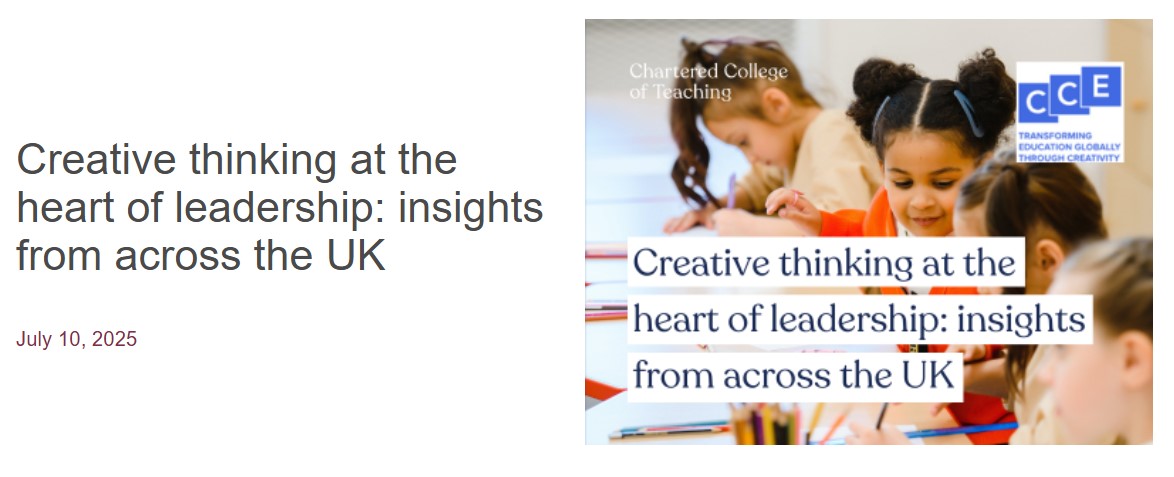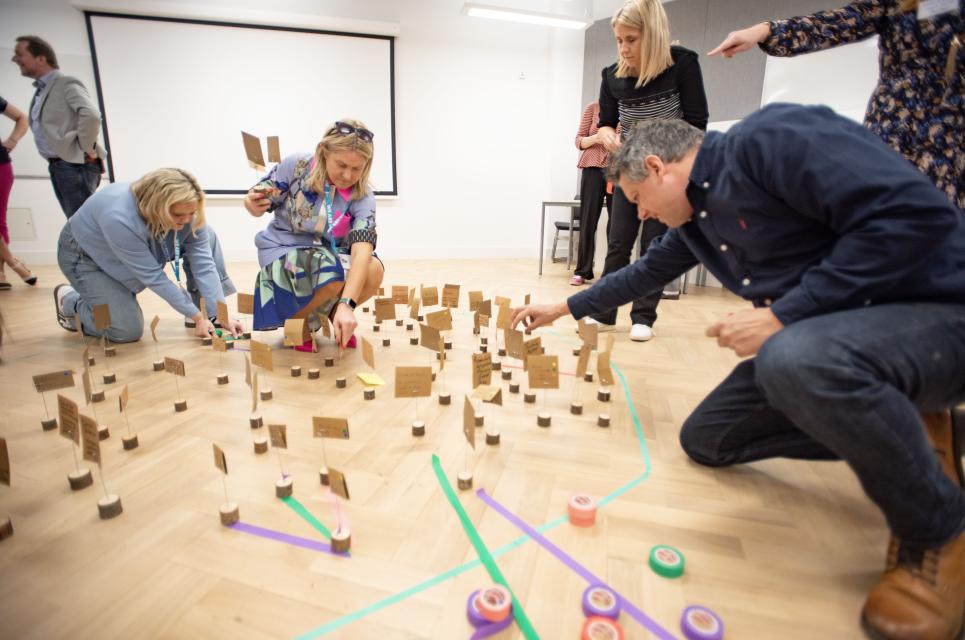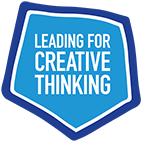Creative thinking at the heart of leadership: insights from across the UK
By Nia Richards, Director of Creativity, Culture and Education (CCE) and Jenna Crittenden, Teacher Advocacy Lead at Chartered College of Teaching.

Recently, we wrapped up a remarkable series of Leading for Creative Thinking roundtables, delivered in partnership with the Chartered College of Teaching. From London to Manchester, Belfast to Cardiff, Glasgow to Plymouth, we convened leaders from government, schools, early years, higher education, industry and organisations to explore one vital question: How do we lead for creative thinking, together?
Leading for Creative Thinking is a CCE-led initiative that began life as a publication, Creative Thinking in Schools: A Leadership Playbook, and has since evolved into a practical website supporting leaders to lead others in creative thinking – colleagues and students alike. The roundtables began with a simple idea, to simply get offline and grow a community of creative leaders. Not by identifying the next generation of leaders, but by coalescing those already doing the work, often under the radar and inviting them to explore big picture system change with us.
Every roundtable was unique, shaped by the voices and contexts in the room. Yet one message came through loud and clear, creative thinking is not a ‘nice to have’. It’s core to the curriculum, to professional identity, and to preparing young people for a fast-changing world. As Leor Zmigrod and Julia Ebner noted on BBC Radio 4’s Today programme in June, people who think imaginatively are more psychologically resilient to extremism. This isn’t just about how we educate; it’s about the kind of society we want to live in.
We’re not alone in championing creativity as a foundational capability. The World Economic Forum’s Future of Jobs 2023 report ranks creative thinking as the second most important skill for today’s workforce, just behind analytical thinking. Beyond economic growth, Andreas Schleicher at the OECD rightly points out that creative thinking deepens learning, activates higher-order cognitive skills, and builds resilience. It’s what helps children grow into adults who can continually adapt, collaborate and learn.
At CCE, we’ve worked with partners and their schools across the world supporting them to integrate creativity across the curriculum and researching the impact, since 2008. We know that when it’s approached with intentionality, and when the climate and conditions are set right, it transforms the experience of learning and teaching. More recently, through our work with the North East Creativity Collaborative, we’ve seen how professional learning communities and distributed leadership can amplify creativity across whole school systems. Cragside Primary, the lead school, was recently recognised by Ofsted and the TES schools awards for the impact of its creative leadership.
What’s more, teachers want this. They want to teach for creativity and see their pupils learning creatively. But the system doesn’t always support that ambition. The Teaching Commission’s 2025 report warns that a loss of professional agency and creativity is driving teachers out of the profession. We firmly believe, if we want teachers to be creative, we need leaders, at every level, who think, see and do differently, and we understand that doing so often demands more courage than any one person should be expected to muster alone.

At the roundtables, the conversation didn’t start with why creativity matters, it started with how we make it sustained and embedded. Even in England, we found leaders leading for creative thinking and rallying others to ‘use existing frameworks creatively… and use them to drive the curriculum’.
In our CCE style, the roundtables knitted plenty of creativity into the format, encouraging dialogue, elements of both surprise and serious reflection. In some locations, we were joined by our Leading for Creative Thinking partners, Emerita Professor Louise Stoll and Professor Bill Lucas, who introduced new theoretical perspectives.
What emerged was powerful. When educators are given time to be both professional and playful, cross boundaries, and challenge assumptions, they rediscover not only their purpose but their collective courage. This was in stark contrast to the consistent stories of isolation we heard, of leaders acting out of moral imperative, but often without the support they need to thrive. Many are ready to influence and mentor others within their ecosystems, if the system can just encourage it.
What struck me most was how these conversations revealed the hidden dynamics of the system by bringing together diverse voices, setting aside status, and focusing on everyone’s ability to contribute to change. Louise Stoll’s introduction of social network theory reminded us that change doesn’t happen in isolation, it requires connection, exchange and shared responsibility to embed creative thinking throughout the system.
Of course, assessment reform had to be the elephant in the room, a recurring challenge in these discussions, particularly for secondary leaders. It remains a significant barrier to transformation, even in places like Wales and Scotland, where progress on creativity has been strong for over a decade. However, the roundtables reinforced what we’ve long believed, when we connect the dots between schools, systems and research, when people who care deeply and think differently come together, creative thinking and change stop being an aspiration.
We’re grateful to the Chartered College of Teaching for being part of this UK tour with us, and to our regional partners including Education Scotland, Welsh Government, Greater Manchester Combined Authority, Ulster University, the Penryn Collaborative, Real Ideas, and Arts Council of Wales. The insights we’ve collected will shape the next phase of our work: helping schools lead for creative thinking in ways that are bold, sustainable, and deeply rooted in place and community.
A recent MIT study warned that overreliance on AI tools like ChatGPT may reduce deep cognitive engagement and independent thinking. If we’re serious about nurturing creative, critical thinkers, it starts with us. As leaders, we must protect and prioritise professional spaces where human connection, intellectual curiosity, imagination and agency can flourish – in our schools and in our networks.
If this strikes a chord, know that you’re not alone. There’s a network of leaders thinking like you, perhaps you’re already part of it, or on the cusp of finding it.
This blog was first published on 10 July 2025 by the Chartered College of Teaching: https://chartered.college/news-blogs/creative-thinking-at-the-heart-of-leadership-insights-from-across-the-uk/
